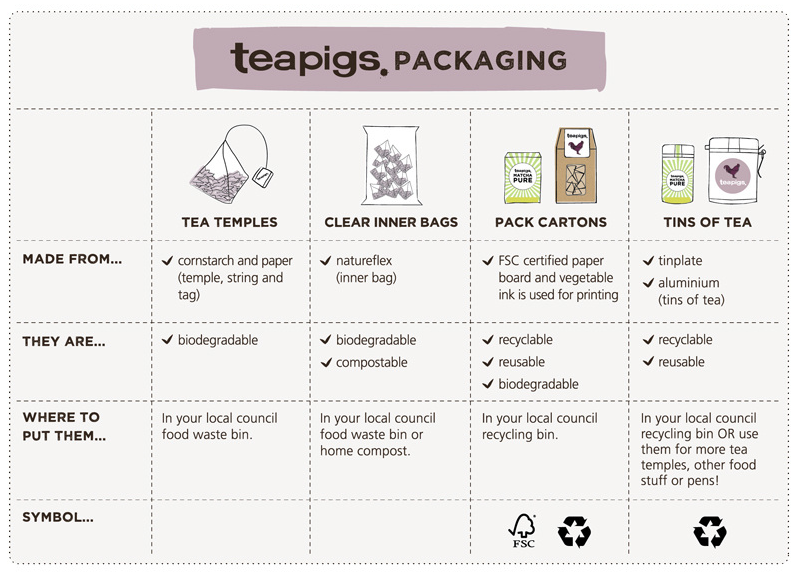Petition URL: Remove Plastics from Tea Bags
A quarter of a million online signatures collected by gardener Michael Armitage proved the tipping point for PG Tips, a Unilever brand that announced last week it will phase out plastic in its teabags.
Unilever pledged to make all its teabags out of 100 percent plant-based material by year end. An initial run, replacing plastic with cornstarch, to make them completely biodegradable, will appear on shelves as soon as this week.
Expect other brands to follow.
The British consume 10 billion PG Tips teabags annually, most containing polypropylene. It is the leading brand in a country that discards 165 million teabags per day (60.2 billion cups of tea annually). Armitage, who lives in North Wales, first wrote to Unilever in June 2017 asking that the company to do away with plastic after seeing the plastic skeletons of pyramid teabags in garden soil. The company replied that its teabags are “80 percent fully compostable paper fiber” and suggested consumers remove the tea from the bag before composting.
“Tea bags CAN be composted/added to food waste collection and although there is a small amount of non-compostable material this is not a problem,” reads the reply.
As of Feb. 28, 232,358 petitioners disagreed. It took six months for the petition to gather 1,000 signatures but only eight days to reach 10,000 following a BBC Radio report. A month later the tally was 150,000 and in five more days, ending Feb. 10, the petition topped 200,000.
The polypropylene seals tea leaves within the teabag so that it will retain its pyramid (or similar) shape. Brands that use polypropylene include Yorkshire Tea, Tetley Tea, Clipper, Typhoo, and Twinings tea. Pukka Herbs, Teapigs, and Jacksons of Piccadilly, Aldi, Waitrose, all less widely known brands, were found to be polypropylene free.
tipping point for PG Tips, a Unilever brand that announced last week it will phase out plastic in its teabags.
Unilever pledged to make all its teabags out of 100 percent plant-based material by year end. An initial run, replacing plastic with cornstarch, to make them completely biodegradable, will appear on shelves as soon as this week.
Expect other brands to follow.
The British consume 10 billion PG Tips teabags annually, most containing polypropylene. It is the leading brand in a country that discards 165 million teabags per day (60.2 billion cups of tea annually). Armitage, who lives in North Wales, first wrote to Unilever in June 2017 asking that the company to do away with plastic after seeing the plastic skeletons of pyramid teabags in garden soil. The company replied that its teabags are “80 percent fully compostable paper fiber” and suggested consumers remove the tea from the bag before composting.
“Tea bags CAN be composted/added to food waste collection and although there is a small amount of non-compostable material this is not a problem,” reads the reply.
As of Feb. 28, 232,358 petitioners disagreed. It took six months for the petition to gather 1,000 signatures but only eight days to reach 10,000 following a BBC Radio report. A month later the tally was 150,000 and in five more days, ending Feb. 10, the petition topped 200,000.
The polypropylene seals tea leaves within the teabag so that it will retain its pyramid (or similar) shape. Brands that use polypropylene include Yorkshire Tea, Tetley Tea, Clipper, Typhoo, and Twinings tea. Pukka Herbs, Teapigs, and Jacksons of Piccadilly, Aldi, Waitrose, all less widely known brands, were found to be polypropylene free.
 A Unilever spokesperson said that moving to plant-based plastics “is part of our broader commitment as a company about creating recyclable packaging. It's been in our pipeline for several years,” she wrote.
“Most people just did not realize you could put plastic in a teabag. It has taken them by surprise-many people were very indignant about it,” he told the Sunday Times. Armitage, who runs the online magazine Nature Matters, turned to 38 Degrees, a website currently hosting thousands of petition campaigns for everything from reducing the pension age for women to 60 (675,674 signatures); to improving heritage parks, and local schools, to financing local hospitals, and many Quixotic causes.
A Unilever spokesperson said that moving to plant-based plastics “is part of our broader commitment as a company about creating recyclable packaging. It's been in our pipeline for several years,” she wrote.
“Most people just did not realize you could put plastic in a teabag. It has taken them by surprise-many people were very indignant about it,” he told the Sunday Times. Armitage, who runs the online magazine Nature Matters, turned to 38 Degrees, a website currently hosting thousands of petition campaigns for everything from reducing the pension age for women to 60 (675,674 signatures); to improving heritage parks, and local schools, to financing local hospitals, and many Quixotic causes.
 tipping point for PG Tips, a Unilever brand that announced last week it will phase out plastic in its teabags.
Unilever pledged to make all its teabags out of 100 percent plant-based material by year end. An initial run, replacing plastic with cornstarch, to make them completely biodegradable, will appear on shelves as soon as this week.
Expect other brands to follow.
The British consume 10 billion PG Tips teabags annually, most containing polypropylene. It is the leading brand in a country that discards 165 million teabags per day (60.2 billion cups of tea annually). Armitage, who lives in North Wales, first wrote to Unilever in June 2017 asking that the company to do away with plastic after seeing the plastic skeletons of pyramid teabags in garden soil. The company replied that its teabags are “80 percent fully compostable paper fiber” and suggested consumers remove the tea from the bag before composting.
“Tea bags CAN be composted/added to food waste collection and although there is a small amount of non-compostable material this is not a problem,” reads the reply.
As of Feb. 28, 232,358 petitioners disagreed. It took six months for the petition to gather 1,000 signatures but only eight days to reach 10,000 following a BBC Radio report. A month later the tally was 150,000 and in five more days, ending Feb. 10, the petition topped 200,000.
The polypropylene seals tea leaves within the teabag so that it will retain its pyramid (or similar) shape. Brands that use polypropylene include Yorkshire Tea, Tetley Tea, Clipper, Typhoo, and Twinings tea. Pukka Herbs, Teapigs, and Jacksons of Piccadilly, Aldi, Waitrose, all less widely known brands, were found to be polypropylene free.
tipping point for PG Tips, a Unilever brand that announced last week it will phase out plastic in its teabags.
Unilever pledged to make all its teabags out of 100 percent plant-based material by year end. An initial run, replacing plastic with cornstarch, to make them completely biodegradable, will appear on shelves as soon as this week.
Expect other brands to follow.
The British consume 10 billion PG Tips teabags annually, most containing polypropylene. It is the leading brand in a country that discards 165 million teabags per day (60.2 billion cups of tea annually). Armitage, who lives in North Wales, first wrote to Unilever in June 2017 asking that the company to do away with plastic after seeing the plastic skeletons of pyramid teabags in garden soil. The company replied that its teabags are “80 percent fully compostable paper fiber” and suggested consumers remove the tea from the bag before composting.
“Tea bags CAN be composted/added to food waste collection and although there is a small amount of non-compostable material this is not a problem,” reads the reply.
As of Feb. 28, 232,358 petitioners disagreed. It took six months for the petition to gather 1,000 signatures but only eight days to reach 10,000 following a BBC Radio report. A month later the tally was 150,000 and in five more days, ending Feb. 10, the petition topped 200,000.
The polypropylene seals tea leaves within the teabag so that it will retain its pyramid (or similar) shape. Brands that use polypropylene include Yorkshire Tea, Tetley Tea, Clipper, Typhoo, and Twinings tea. Pukka Herbs, Teapigs, and Jacksons of Piccadilly, Aldi, Waitrose, all less widely known brands, were found to be polypropylene free.
 A Unilever spokesperson said that moving to plant-based plastics “is part of our broader commitment as a company about creating recyclable packaging. It's been in our pipeline for several years,” she wrote.
“Most people just did not realize you could put plastic in a teabag. It has taken them by surprise-many people were very indignant about it,” he told the Sunday Times. Armitage, who runs the online magazine Nature Matters, turned to 38 Degrees, a website currently hosting thousands of petition campaigns for everything from reducing the pension age for women to 60 (675,674 signatures); to improving heritage parks, and local schools, to financing local hospitals, and many Quixotic causes.
A Unilever spokesperson said that moving to plant-based plastics “is part of our broader commitment as a company about creating recyclable packaging. It's been in our pipeline for several years,” she wrote.
“Most people just did not realize you could put plastic in a teabag. It has taken them by surprise-many people were very indignant about it,” he told the Sunday Times. Armitage, who runs the online magazine Nature Matters, turned to 38 Degrees, a website currently hosting thousands of petition campaigns for everything from reducing the pension age for women to 60 (675,674 signatures); to improving heritage parks, and local schools, to financing local hospitals, and many Quixotic causes.
Plastic at sea
Plant-based bioplastics are fully biodegradable and disposable either in paper recycling or food waste but do not easily degrade in water. Researchers are seeking next-generation biopolymers that are more environmentally friend and equally functional to petroleum-based plastics. A BBC Report states that “more than 5 trillion pieces of plastic are floating in the world’s oceans. Many will take 1000 or more years to degrade and often this amounts to breaking into miniscule particles consumed by sea life. France recently banned single-use plastic bags. Norway offers a bounty for returning plastics via vending machines and the UK is committed to eliminating all avoidable plastic waste by 2042, according to BBC’s Technology of Business report. Source: BBC, The Guardian
